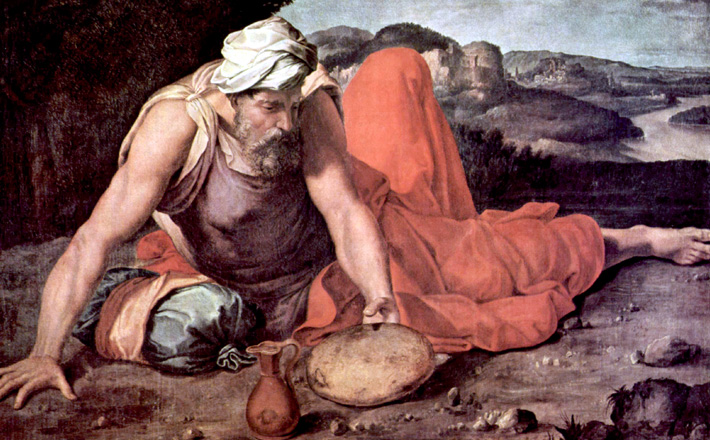Commentary on Luke 8:26-39
Groucho Marx once famously observed that he would never want to be a part of a club that would accept him as a member.
As we continue our journey to understand who Jesus is we may begin to wonder if we really want to be a part of his followers. After all, think of the people we have encountered who recognize and honor Jesus: a Roman centurion, a woman of questionable morals, and now a man possessed by many demons living amongst the tombs. Are these really the people with whom we want to be associated?
Clearly the people in the country of the Gerasenes did not want to be associated with a man so possessed they could not control him. They had tried to protect him and themselves by binding him with chains. But it did no good. Possessed, he was far stronger than any help or imprisonment. Eventually the demon, we are told, had driven him away from all people and into the land of the dead. He roamed naked among the tombs. For his family, he was probably just that, dead.
We have met one of the “who” in our report. Now it is time for this “who” to meet Jesus. The author of Luke-Acts tells us, “One day, Jesus got into a boat … ‘Let us go across to the other side of the lake’” (Luke 8:22). This has a rather odd, mundane tone. It does not tell us why or for what reason Jesus wanted to cross the lake. It seems like a whim or a lark. Unfortunately it was during this outing that they encountered the windstorm that nearly cost them all their lives. When Jesus calmed the storm and saved all their lives the disciples were shocked and wondered, “Who then is this, that he commands even the winds and the water, and they obey him?” (Luke 8:25).
The disciples still were not sure who this man Jesus was. Yet quickly they meet someone (or rather some things) who knows exactly who Jesus is. Jesus and the disciples have finally arrived at the other side of the lake. (As an aside, we need to remember that this lake is not what most of us think of when we picture a lake. The Lake of Genneserat or the Sea of Galilee is 8 miles wide by 13 miles long.) As the disciples were no doubt calming their nerves after their brush with death they meet the man given up for dead. The naked, wild man falls at the feet of Jesus screaming, “What have you to do with me, Jesus, Son of the Most High God?” (Luke 8:28).
The man is not asking for help. He is not asking for healing. He is asking Jesus to leave him alone. This same plea occurs later in the story as well. This man, and later the people of the region recognize what the writer of the Letter to the Hebrews declared, “It is a fearful thing to fall into the hands of the living God” (Hebrews 10:31).
It is a story of the unclean. Tombs are unclean. Pigs are unclean. And we are told that it was an unclean spirit. This unclean spirit knew who Jesus was and was rightfully afraid. As soon as Jesus saw the man he knew that the man was possessed and without the man asking had ordered the spirit out. But how unusual is it that the spirit negotiates with Jesus, I cannot think of any other demons that were able to bargain with God. What’s more, they succeed — or do they? If they can no long inhabit this poor man, whom they have made unclean, might they inhabit the unclean pigs? “Why of course,” Jesus agrees. Perhaps this causes an “unclean” overload and the demon filled pigs rush into the lake. The pigs drown and the spirits find themselves just where they hoped that they would not go, the abyss, the bottomless pit where they join the fallen angels and spirits “kept in eternal chains in deepest darkness for the judgment of the great day” (Jude 1:6).
The man, on the other hand, has been released from the chains of possession and the deep darkness that clouded his mind. Like the woman at Simon’s house he is still at the feet of Jesus, but now dressed and “in his right mind” (Luke 8:35). Yet the crowd that has gathered, having heard the stories about the amazing things taking place among the tombs and at the lakeshore, does not rejoice. Rather they are afraid and like the man and the demons, beg Jesus to leave them alone.
Who is this man who returns a man to his right mind? Who is this man who commands demons? The author of Luke-Acts gives us a very clear statement at the end of the tale. When Jesus gets into the boat to return across the lake the man asks to “be with him,” which is a way of saying that the man wishes to become a follower of Jesus. But Jesus tells the man to go home. Just as Jesus gave the widow back her son, Jesus is giving the man’s family back their son. The dead will be given new life. And Jesus tells the man to “declare how much God has done for you” (Luke 8:39). That is what the man does, but his message is somewhat different, “he went away, proclaiming throughout the city how much Jesus had done for him” (Luke 8:39). Who is this? The man is telling us that Jesus is no less than God himself.
While many in our world continue to believe in the possibility of demon possession, many more today feel possessed and powerless before addictions and mental illnesses. This may be an opportunity for the preacher to raise these important issues that bring torment to many individuals and their families.


June 19, 2016